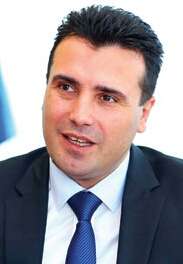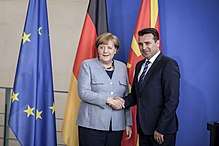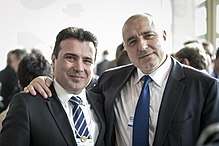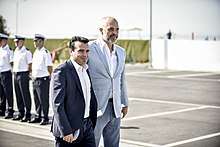Zoran Zaev
| Zoran Zaev Зоран Заев | |
|---|---|
 | |
| 8th Prime Minister of Macedonia | |
|
Assumed office 31 May 2017 | |
| President | Gjorge Ivanov |
| Preceded by | Emil Dimitriev |
| Leader of the Opposition | |
|
In office 2 June 2013 – 31 May 2017 | |
| Preceded by | Branko Crvenkovski |
| Succeeded by | Nikola Gruevski |
| Mayor of Strumica | |
|
In office 22 March 2005 – 22 December 2016 | |
| Preceded by | Kiril Janev |
| Succeeded by | Kostadin Kostadinov |
| Personal details | |
| Born |
8 October 1974 Strumica, Yugoslavia (now Macedonia) |
| Political party | Social Democratic Union |
| Spouse(s) | Zorica Zaeva |
| Alma mater | University of Skopje |
Zoran Zaev (Macedonian: Зоран Заев; born 8 October 1974) is a Macedonian economist and politician who has served as the Prime Minister of Macedonia since 31 May 2017. Prior to taking office as Prime Minister, Zaev was a member of the Macedonian Assembly between 2003 and 2005, and mayor of Strumica between 2005 and 2016. He is president of the center-left Social Democratic Union of Macedonia.[1][2]
Early life and education
Zoran Zaev was born on 8 October 1974 in Strumica. After finishing elementary and high school in his hometown, he enrolled at the Skopje Faculty of Economics from which he graduated in 1997. Zaev earned a master's degree in monetary economics at the same university.
Political career
Zaev became a member of Social Democratic Union of Macedonia in 1996. He was elected as chairman of the Party's Strumica regional administration two times.[3] He served as Party's Vice President between 2006 and 2008.[2] He won three consecutive local elections and served as mayor of Strumica from 2005 to 2016. After Branko Crvenkovski stepped down as SDSM's leader in 2013, Zaev was elected as a new leader. In addition, he served as a member of the Macedonian Assembly from 2003 to 2005.[2] Following 2016 parliamentary election, Zaev formed a coalition government with the support from the Democratic Union for Integration and the Alliance for Albanians in May 2017.
Controversy
In January 2015, former Macedonian Prime Minister Nikola Gruevski accused Zaev for the alleged conspiracy with a foreign intelligence service and a diplomats to topple the Government, and involvement in the allegedly attempted coup d'état.[4] Zaev in February accused Gruevski of wiretapping and illegally spying at least 20,000 people in the country. The public prosecutor, on the other hand, accused Zaev of blackmailing Gruevski and detained five people connected with that case.[5] The case was later dropped due to insufficient evidence.[6]
Following his election as a SDSM president, he became leader of the opposition. As leader of the opposition, Zaev took part in a meeting with Gruevski and European Union's enlargement commissioner Johannes Hahn in June 2015 in order to overcome the political crisis. The negotiations resulted in the Pržino Agreement, which foresaw a caretaker government to organize a snap election in April 2016 and a Special Public Prosecution to investigate the wiretaps scandal. Zaev threatened to boycott the election because of Gruevski's obstructed of the Pržino Agreement and the reforms in the judiciary system and the media.[7]
Prime Minister

.jpg)
On May 31, 2017 the Macedonian Parliament confirmed Zaev as the new Prime Minister with 62 out of 120 MPs voting in favor. The voting ended months of political uncertainty.[8] A survey of 1,159 Macedonian citizens carried out in June 2017 by the Macedonian Brima Gallup International Association, showed that 62% of the population supported Zaev as a Prime Minister.[9] During his speech, Zaev presented the program of the new government, saying that joining NATO and the EU would be its priority in the following years. He also promised economic growth and an end to corruption by announcing a "responsible, reformist and European government".[10]
Some newspapers interpreted some Zaev's statements for the newspapers BGNES and Kurir as a claim asserting the Macedonians as one people with the Bulgarians or the Serbs.[11][12][13] What Zaev was recorded to say on the original video interview of the Bulgarian newspaper "BGNES" was "I want to send a message to all the citizens of Bulgaria. We are brotherly people, the same folk.", and what he stated during an interview for the Serbian newspaper "Kurir" was "The Serbs and the Macedonians are brotherly people" and "Nobody asked Zoran Zaev to do anything against Macedonians, against Serbs, against any ethnic community, or against any of our neighbors. We heard allegations asserting Zaev as condemning Serbia for a genocide. It's for me the same my people."[14][15]
Negotiations with Bulgaria for a treaty for friendship and cooperation

Macedonia and Bulgaria have complicated neighbourly relations. In 2012 Bulgaria joined Greece in blocking Macedonia from obtaining a start date for EU accession talks. Sofia has accused Skopje of discriminating against ethnic Bulgarians and of generating an anti-Bulgarian atmosphere in the country. Prospects for improved relations between Macedonia and Bulgaria have risen since Zaev-led government took power in Skopje in May 2017. In June on a meeting with Zaev in Sofia, PM Boyko Borissov said Bulgaria backs Macedonia’s bid to join the European Union and NATO and will also sign a long-delayed friendship treaty with it. As result the governments of Bulgaria and Macedonia signed the friendship treaty to bolster the relations between the two Balkan states on August 1. It was preceded by 18 years of heavy negotiations.[16] The treaty calls for a committee to "objectively re-examine the common history" of Bulgaria and Macedonia and envisages both countries will celebrate together events from their shared history.[17] "Macedonia and Bulgaria have a lot of common history and this is the stepping stone for Macedonia's European and Euro-Atlantic future," Zaev said during the ceremony in Skopje. The treaty was ratified by the parliament of the Republic of Macedonia on the 15th of and of Bulgaria on 18 January 2018.
Negotiations with Greece for naming dispute
.jpg)
During the last years in Opposition and also in his inauguration speech, the new Prime Minister Zoran Zaev vowed his determination to resolve the decades-old dispute with Greece.[18][19][20][21]
Efforts between the governments of the two countries for resolving the name dispute intensified, and on 17 January 2018, UN-sponsored negotiations had resumed, with the Ambassadors of Greece and Macedonia, Ambassadors Adamantios Vassilakis and Vasko Naumovski, meeting with the UN Envoy at Washington,[22][23] who suggested five names in his proposal, all containing the name Macedonia transliterated from Cyrillic.
After the Zaev-Tsipras meeting in Davos, Zaev announced that streets and locations such as the Alexander the Great airport in Skopje which were named by the nationalist VMRO-DPMNE after Ancient Macedonian heroes and figures such as Alexander the Great, could be renamed as a sign of goodwill towards Greece. Specifically, Zaev declared that the Alexander the Great Highway, the E-75 motorway that connects Skopje to Greece, could be renamed to "Friendship Highway". In exchange, the Greek PM announced that Greece could consent to Macedonia's bid to the Adriatic-Ionian Cooperation Agreement and the Greek Parliament could ratify the second phase of the European Union Association Agreement with Macedonia as part of the accession of Macedonia to the European Union which was blocked in 2009 by Greece owing to the name dispute.[24][25]
In late February 2018, the government and institutions of the Republic of Macedonia announced the halt of the Skopje 2014 program, which aimed to make Macedonia’s capital have a "more classical appeal" and begun removing its controversial monuments and statues. In Spring 2018, extensive negotiations in a bid to resolve the naming dispute were held in rounds, with frequent meetings of the Foreign Ministers of Greece and Macedonia achieving tangible progress on the naming dispute.[26][27]
On 12 June 2018, Greek prime minister Alexis Tsipras announced that an agreement had been reached with his Macedonian counterpart Zoran Zaev on the dispute, "which covers all the preconditions set by the Greek side".[28] The proposal would result in the Republic of Macedonia being renamed the Republic of North Macedonia (Macedonian: Република Северна Македонија, translit. Republika Severna Makedonija; Greek: Δημοκρατία της Βόρειας Μακεδονίας[29]), with the new name being used for all purposes.[30] Zaev announced that the deal includes recognition of the Macedonian language in the United Nations and that the citizens of the country will be called, as before, Macedonians. However there would also be an explicit clarification that the citizens of the country are not related to the Ancient Macedonians.[31]
On 5 July, the Prespa agreement was ratified again by the Macedonian parliament with 69 MPs voting in favor of it.[32]
On 11 July, NATO invited Macedonia to start accession talks in a bid to become the EuroAtlantic alliance’s 30th member.[33]
On 30 July, the parliament of Macedonia approved plans to hold a non-binding referendum on changing the country's name that will take place on September 30.[34]
Notes
References
- ↑ "Macedonia Parliament Approves New Gov't after Prolonged Stalemate".
- 1 2 3 "Biography of Zoran Zaev". Social Democratic Union of Macedonia. Retrieved May 21, 2017.
- ↑ "SDSM Administration of Strumica". Social Democratic Union of Macedonia. Archived from the original on May 26, 2017. Retrieved May 21, 2017.
- ↑ MacDowall, Andrew (February 28, 2015). "Fears for Macedonia's fragile democracy amid 'coup' and wiretap claims". The Guardian. Retrieved May 21, 2017.
- ↑ "Macedonian Opposition Leader Accuses Government Of Wiretapping". Radio Free Europe/Radio Liberty. February 9, 2015. Retrieved May 21, 2017.
- ↑ "SPO Drops Coup Case: Katica Janeva Will Not Prosecute Zaev, Verusevski due to Insufficient Evidence". The Independent. January 18, 2017. Retrieved May 21, 2017.
- ↑ "Macedonia opposition says will boycott election". Business Insider. April 7, 2016. Retrieved May 21, 2017.
- ↑ "Macedonian MPs vote in new government after deadlock". BBC. June 1, 2017. Retrieved June 2, 2017.
- ↑ "БГНЕС | Галъп: 62% подкрепят Зоран Заев за премиер". www.bgnes.com (in Bulgarian).
- ↑ "Macedonia forms new government 6 months after election". Politico. June 1, 2017. Retrieved June 2, 2017.
- ↑ "Заев во исти ден тврди дека Македонците се Бугари, па потоа тврди дека Македонците се Срби (ВИДЕО)". Kurir.mk (in Macedonian). 2 May 2017.
- ↑ Зоран Заев: Македонците са един и същ народ с българите и сърбите.
- ↑ "Зоран Заев ја кажа вистината – Македонците и Бугарите се ист народ". Дневник.
- ↑ "БГНЕС | Зоран Заев: Македония няма да бъде двунационална, България и Борисов са наши големи приятели". www.bgnes.com (in Bulgarian).
За България ние сме братски хора, един народ. (original in video 2:37-2:45 Jас сакам да изпратам парака до сите грагани на Бугариjа - ние сме братски хора, същи народ.)
- ↑ (KURIR TV) DA SE NE LAŽEMO! INTERVJU ZORAN ZAEV: Srbi su naša braća, Gruevski je KRIMINALAC!.
A Srbi i Makedonci su bratski narod...Niko nije tražio da Zoran Zaev uradi nešto protiv Makedonaca, protiv Srba, protiv bilo koje etničke zajednice ili protiv bilo koga od naših suseda. Čuli smo optužbe da je Zaev prihvatio da tuži Srbiju za genocid. To je za mene isti, moj narod.
- ↑ PMs Borisov and Zaev place wreaths at Gotse Delchev’s grave in Skopje, 2 August 2017, FOCUS News Agency.
- ↑ Macedonia, Bulgaria Sign Historic Treaty, Renounce Rivalry, Aug. 1, 2017, The New York Times.
- ↑ "Macedonia's Ruling SDSM Claims Victory In Municipal Elections After Early Results". Retrieved 24 January 2018.
- ↑ "Macedonia's PM hopes for quick solution to name dispute with Greece". Retrieved 24 January 2018.
- ↑ "Macedonia naming dispute: Balkan nation set to resolve 25-year-old row with Greece for seats in NATO, EU". Retrieved 24 January 2018.
- ↑ "Macedonia and Greece appear close to settling 27-year dispute over name". Retrieved 24 January 2018.
- ↑ "Nimetz: Term 'Macedonia' to be included in name proposal". Kathimerini. Retrieved 24 January 2018.
- ↑ "UN presents new proposals on Greece-Macedonia name dispute". The Washington Post. Retrieved 24 January 2018.
- ↑ "Macedonia Extends Olive Branch To Greece In Name Dispute". Retrieved 24 January 2018.
- ↑ "Public awareness campaign the next step, following the positive Tsipras - Zaev meeting in Davos". BalkanEU. Retrieved 24 January 2018.
- ↑ "New Dimitrov - Kotzias meeting in Thessaloniki this week". Republika.mk. Retrieved 20 May 2018.
- ↑ "Kotzias and Dimitrov report progress after name talks, say process is continuing". ANMA. Retrieved 20 May 2018.
- ↑ "'We have a deal,' Greek PM says over FYROM name row | Kathimerini". ekathimerini.com. Η Καθημερινή. 12 June 2018. Retrieved 12 June 2018.
- ↑ http://s.kathimerini.gr/resources/article-files/symfwnia--2.pdf, p. 3.
- ↑ "Greece ends 27-year Macedonia name row". BBC News. 12 June 2018. Retrieved 12 June 2018.
- ↑ "Republic of North Macedonia with Macedonian language and identity, says Greek media". Meta.mk. Meta. 12 June 2018. Retrieved 12 June 2018.
- ↑ "Macedonia's parliament endorses name deal with Greece for second time". Reuters. 5 July 2018. Retrieved 6 July 2018.
- ↑ "NATO Invites Macedonia to Join the Western Alliance". Balkan Insight. 11 July 2018. Retrieved 13 July 2018.
- ↑ "Macedonia to hold name-change referendum on 30 September". SBS News. 30 July 2018. Retrieved 31 July 2018.
External links
| Political offices | ||
|---|---|---|
| Preceded by Branko Crvenkovski |
Leader of the Opposition 2013–2017 |
Succeeded by Nikola Gruevski |
| Preceded by Emil Dimitriev |
Prime Minister of Macedonia 2017–present |
Incumbent |
